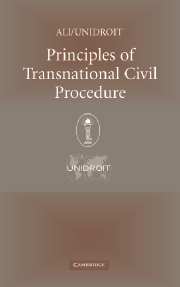Book contents
- Frontmatter
- Contents
- Foreword
- Reporters' Preface
- Preface, by E. Bruce Leonard
- Preface, by Jorge A. Sánchez-Cordero Dávila
- A Drafter's Reflections on the Principles of Transnational Civil Procedure, by Geoffrey C. Hazard, Jr.
- Introduction
- PRINCIPLES OF TRANSNATIONAL CIVIL PROCEDURE (with commentary)
- PRINCIPLES OF TRANSNATIONAL CIVIL PROCEDURE (with commentary), French Version
- APPENDIX: REPORTERS' STUDY
- RULES OF TRANSNATIONAL CIVIL PROCEDURE (with commentary)
- A Bibliography of Writings about the ALI/UNIDROIT Project
- Index
PRINCIPLES OF TRANSNATIONAL CIVIL PROCEDURE (with commentary)
Published online by Cambridge University Press: 06 January 2010
- Frontmatter
- Contents
- Foreword
- Reporters' Preface
- Preface, by E. Bruce Leonard
- Preface, by Jorge A. Sánchez-Cordero Dávila
- A Drafter's Reflections on the Principles of Transnational Civil Procedure, by Geoffrey C. Hazard, Jr.
- Introduction
- PRINCIPLES OF TRANSNATIONAL CIVIL PROCEDURE (with commentary)
- PRINCIPLES OF TRANSNATIONAL CIVIL PROCEDURE (with commentary), French Version
- APPENDIX: REPORTERS' STUDY
- RULES OF TRANSNATIONAL CIVIL PROCEDURE (with commentary)
- A Bibliography of Writings about the ALI/UNIDROIT Project
- Index
Summary
Scope and Implementation
These Principles are standards for adjudication of transnational commercial disputes. These Principles may be equally appropriate for the resolution of most other kinds of civil disputes and may be the basis for future initiatives in reforming civil procedure.
Comment:
P-A A national system seeking to implement these Principles could do so by a suitable legal measure, such as a statute or set of rules, or an international treaty. Forum law may exclude categories of matters from application of these Principles and may extend their application to other civil matters. Courts may adapt their practice to these Principles, especially with the consent of the parties to litigation. These Principles also establish standards for determining whether recognition should be given to a foreign judgment. See Principle 30. The procedural law of the forum applies in matters not addressed in these Principles.
P-B The adoptive document may include a more specific definition of “commercial” and “transnational.” That task will necessarily involve careful reflection on local legal tradition and connotation of legal language. Transnational commercial transactions may include commercial contracts between nationals of different states and commercial transactions in a state by a national of another state. Commercial transactions may include sale, lease, loan, investment, acquisition, banking, security, property (including intellectual property), and other business or financial transactions, but do not necessarily include claims provided by typical consumer-protection statutes.
P-C Transnational disputes, in general, do not arise wholly within a state and involve disputing parties who are from the same state.
- Type
- Chapter
- Information
- Principles of Transnational Civil Procedure , pp. 16 - 50Publisher: Cambridge University PressPrint publication year: 2005
- 1
- Cited by



